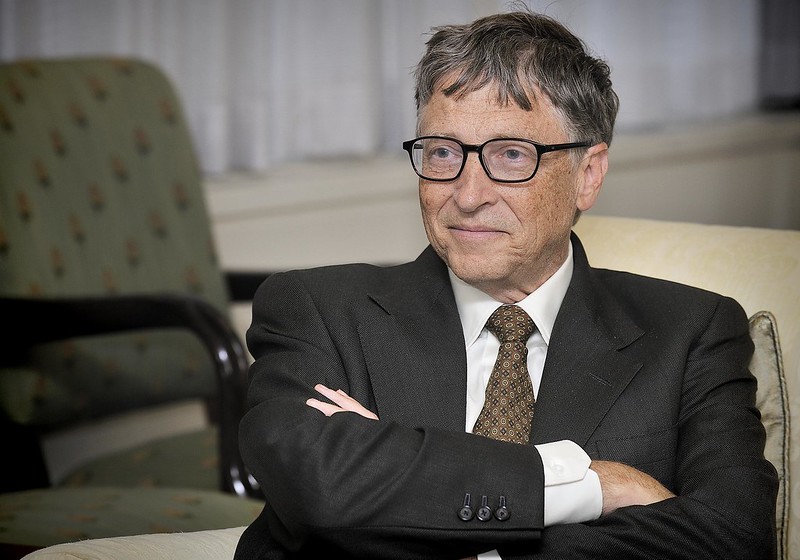
William (Bill) H. Gates, founder, technology advisor of Microsoft Corporation visits The Department of Energy on October 8, 2013. (PHOTO CREDIT: DOE PHOTOGRAPHER, KEN SHIPP)
On Mercola.com, Dr. Joseph Mercola explains that the government isn’t directly funding NPR’s propaganda. Instead, it’s state-aligned oligarchs who put up the money. He writes:
Aside from its federal ties, NPR also receives considerable funding from Bill Gates and other oligarchs. “When you live in an oligarchy like the U.S., receiving funding from oligarchs is not meaningfully distinct from receiving funding from the state,” Johnstone points out.16
Via more than 30,000 grants, Gates has contributed at least $319 million to the media, Alan MacLeod, a senior staff writer for MintPress News, revealed:17
“Recipients of this cash include many of America’s most important news outlets, including CNN, NBC, NPR, PBS and The Atlantic.
Gates also sponsors a myriad of influential foreign organizations, including the BBC, The Guardian, The Financial Times and The Daily Telegraph in the United Kingdom; prominent European newspapers such as Le Monde (France), Der Spiegel (Germany) and El País (Spain); as well as big global broadcasters like Al-Jazeera.”
Examples of the Bill & Melinda Gates Foundation grants include $24,663,066 to NPR. As you might suspect, Gates’ donations come with strings attached, so it shouldn’t come as a surprise that NPR doesn’t stray far from the official narrative on any given topic. Gates’ donations to NPR were intended to target coverage of global health and education:18
“When Gates gives money to newsrooms, it restricts how the money is used — often for topics, like global health and education, on which the foundation works — which can help elevate its agenda in the news media.
… Since 2000, the Gates Foundation has given NPR $17.5 million [now up to $24.6 million19] through 10 charitable grants — all of them earmarked for coverage of global health and education, specific issues on which Gates works …
Even when NPR publishes critical reporting on Gates, it can feel scripted. In February 2018, NPR ran a story headlined ‘Bill Gates Addresses ‘Tough Questions’ on Poverty and Power.’ The ‘tough questions’ NPR posed in this Q&A were mostly based on a list curated by Gates himself, which he previously answered in a letter posted to his foundation’s website.”
NPR Favors Propaganda Over Ethics
NPR also appears to have a vendetta against yours truly and other vaccine safety advocates. In May 2021, we received an email from Geoff Brumfiel, a senior editor and correspondent with NPR.
According to NPR, “his reporting focuses on the intersection of science and national security,”20 but as soon as I read the subject line of the email — “The business of anti-vaccine propaganda” [sp] — it was clear that the line of questioning that would follow was not journalism but rather a PR piece for the pharmaceutical industry.
Indeed, Brumfiel’s email did not disappoint, nor did his resulting article, “For Some Anti-Vaccine Advocates, Misinformation Is Part Of A Business.”21 True to form for NPR, the article presents a slanted view of vaccine safety advocates designed to disparage and discredit those who spoke out against COVID propaganda.
Conveniently, Brumfiel included only one short segment from our emailed response to his questions, but neglected to mention NPR’s tight connections with the Gates Foundation — and the hundreds of articles NPR has released that are highly favorable toward the Gates Foundation and the work it funds.22
Then, in a September 24, 2021, broadcast, NPR reporter Robin Young referred to me as “the biggest disseminator of lies about COVID” — a false statement originating with a dark money-funded organization called Center for Countering Digital Hate (CCDH). Young then went on to claim that I started America’s Frontline Doctors, an independent organization that, in reality, I am not a member of and have no affiliation with.
The hit pieces further exemplify NPR’s habit of putting propaganda ahead of ethics and even basic journalism. Facebook’s vice president of content policy, Monika Bickert, issued a statement August 18, 2021, saying there is no evidence to support CCDH’s claims, and that the people named by the CCDH as being responsible for the vast majority of vaccine misinformation on social media were in fact only responsible for a tiny fraction — 0.05% — of all vaccine content on Facebook.23
If she’d actually done her research, Young would have discovered that the key tenet of her broadcast was false. Instead, the piece shows that NPR’s guidelines in its Ethics Handbook — that its journalists must “Be able to identify the source of each fact” and are supposed to “explain why that person or organization is credible and authoritative” — are, in fact, just fluff.24
If you’re willing to fight for Main Street America, click here to sign up for the Richardcyoung.com free weekly email.




